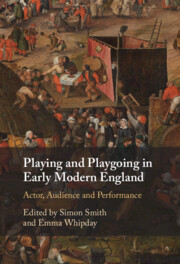Introduction
Published online by Cambridge University Press: 10 March 2022
Summary
The introduction to Playing and Playgoing: Actor, Audience and Performance in Early Modern England argues that the study of theatrical culture is crucial to the scholarly investigation of dramatic texts: not merely of historical interest, but necessary for a full understanding of the plays themselves. Playing and Playgoing works with and reflects on approaches drawn from literary scholarship, theatre history, and performance studies, in seeking to advance the critical conversation on the interactions between: play-texts; performance spaces; the bodily, sensory and material experiences of the playhouse; and playgoers’ responses to, and engagements with, the theatre. This introduction explores three textual and archival examples that suggest the significance of the player-playgoer relationship at the heart of this book – and in so doing, it sets up the questions raised by this volume, and the shared interests that operate across the range of approaches these chapters offer.
Keywords
- Type
- Chapter
- Information
- Playing and Playgoing in Early Modern EnglandActor, Audience and Performance, pp. 1 - 12Publisher: Cambridge University PressPrint publication year: 2022

